- 10 min to read
JAMming in Malaga: How to Build a Remote Working Dev Team on a Company Retreat
This is a story about building Bejamas remote team on a team building trip.
Remote work is comfy, gives you tons of freedom, and saves both employer and employee lots of time and money. I could go on for hours naming cool things about going remote, but let’s be fair, it has a couple of downsides as well.
One of the biggest cons of working as a remote team is that physical human interaction doesn’t really exist unless you put some hard work into getting the team together.
We see a lot more pros than cons for remote approach. While we believe with all our hearts that everyday work doesn’t have to be in person, we think we need to know each other to create an unbreakable team spirit. That’s why we gather the whole team, both the old dogs and newbies, for a company retreat at least three times a year.
For teams working in an office, spending coffee breaks chit-chatting, a company retreat usually is all about having fun with your teammates. For remote teams, it’s more of a rare occasion to get to know each other, discuss future projects, explore new ideas, new tools, and talk about problems.
That’s why it was so important for us to rewrite the classic retreat scenario and plan our trip to be a productive getaway that will boost morale and lead to deeper relationships. At the same time, we met other, more or less unexpected challenges and we worked our way to deal with them as a team.
This is a story about building Bejamas remote team on a team building trip.
Sign up for our Jamstack newsletter!
Get EXCLUSIVE stories like this one in your mailbox!
First, a Couple of Words About Bejamas
Bejamas is a web development shop focused on helping agencies and companies with serverless web, headless CMSs, static site generators,and Jamstack tools. Our key mission is to deliver lightning fast, scalable and secure statically-hosted websites and applications. Bejamas is a fairly new brand on the market. It has its roots in a couple of small web development shop for SMBs established in 2017, though the shape you see it today was born in 2018.
During this time, thanks to many great projects and relationships, we grew to 13 people strong team dedicated to the craft of product building and customer happiness. We grew quite fast to the size where having relationships with the team is harder than grabbing a beer some evening.
We couldn’t be more excited about that, but, to be honest, it’s also a little bit tricky. You see, running a fully remote developers team calls for handling a lot of different challenges.
To make this work, first,we needed to have some clear values to work by.
The Values
I get it that the whole values talk may sound like a classic corporate gibberish, but trust me, that’s really what the remote work thing comes from. They’re our core, something we all believe in. They inform our thoughts, words, and actions - thanks to the values we established all of our decisions are directed towards a specific purpose. So, sit back comfortably and read on.
Meaningful relationships & work environment. We would not be in the place we are now if we didn’t care about building meaningful relationships with both: our customers and our teammates. When it comes to the customers, we help them not only grow their businesses but also educate them to understand the tech behind it. As for employees, we all have different personalities, we like different kinds of music, and prefer different work environments, hence we believe that each person has the right to define his own workspace, in which he feels most comfortable and operates at his peak performance.
Radical transparency. We believe we all benefit from sharing our experiences with others. Being transparent allowed us to spot each other's mistakes, mindfully learn from them and, as a result, improve everyone's skills and knowledge base. This value is also closely related to the one posted above about meaningful relationships. You definitely can’t have those if you’re sweeping problems under the rug.
Tranquil workspace. We strive to create a workspace full of tranquility, where everyone has the possibility to make thoughtful decisions and deliver purposeful work. Let's face it though: we’re aware that in an agency world there will always be situations of urgency, where immediate action is needed to fix an issue or deliver the product on time to our customers. That’s fine. That’s the reality. We just want to make sure those emergencies are in the minority and our work environment is not full of craziness and insanity.
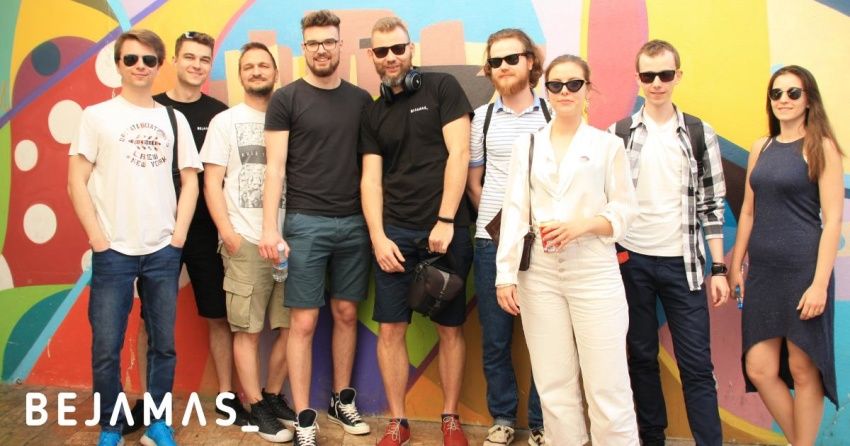
Remote Work: What That Means for Dev Team?
For me, remote work means freedom. I never really felt good when I was bound to work 9-5 from the office at a certain time. Never was a 9-5 girl. Maybe it’s a generational thing. Being able to decide for myself and doing things my way gave me, on top of being more productive, a much better attitude, more enthusiasm, and a head full of fresh ideas. I guess it's a natural thing. Work activities should accompany my lifestyle, not define it.
We want to be a collective of independent thinkers, who neither need to be micromanaged nor pushed to work. People who have strong ethics, know their craft and enjoy the work they do. And letting people live their own way helps to keep their enthusiasm.
There are good reasons for the world opening up for remote work - the environmental ones, economical, sociological, and, above all else, human ones.
As I already mentioned there are downsides of being a remote team and we don’t have perfect recipes for dealing with them yet. After all, we’re one of the first generations that dared to say that work needs to fit them not the other way around. That’s why it’s so important to talk about the downsides as well, and how can we get through them.
Challenges of Running a Remote Team
Lack of personal interaction. Some things are just better done in person. It is really hard having a deeper conversation with people you never saw in real life, over Slack. It's natural for things like that to happen in person.
Lonely island syndrome. Working from home, not surrounded by people who get excited or frustrated by the same thing that triggers you at the moment can be tough. To be honest, sometimes it’s much easier to solve your pressing issues together, sitting in one place.
Teamwork and team spirit issues. Being physically separated from your colleagues may not help you really feel your common goals. For some people, a lack of personal relationships can also have a negative impact on their work motivation or sense of responsibility.
Communication issues. Knowing something about your coworkers’ personalities, or how they work, or what motivates them, or how rough can you go with criticism, so they wouldn’t feel hurt. Yes, that easies the job too.
Solution: Running a Company Retreat
Having all these in mind, for us, there was no better option than going on a trip together and finally match all the Slack profile pictures and nicknames with real people.
Besides, retreats are a ton of fun. And we felt like we simply need some fun. Since we don’t see each other on a daily basis, it’s exciting to have everyone around for a couple of days where we can have endless talks, teach and learn from each other, and make new friendships as people do in an everyday setting. That’s how we all ended up in a beautiful city of Malaga, Spain.
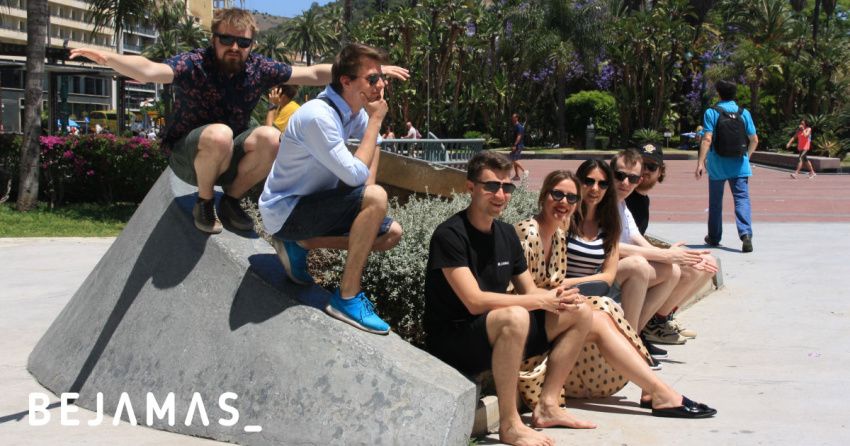
Tips and Tweaks for Organizing a Retreat for a Remote Dev Team
First of All, Picking the Right Spot
There was one important factor we had in mind when choosing the destination for our trip - the sun. As much as Poland, where most of us live, has to offer, the certainty of good weather is not one of its advantages. We didn’t want to end up shivering under the blanket, making new acquaintances with our teeth clinging, so we decided to look for something in southern Europe.
The cool thing for remote teams - as people already live in different cities or countries, we don’t have to think like ‘what is the closest place we could visit’. We can choose a place that will fit our expectations best, and give us the most joy.
For us, it was Malaga in southern Spain’s Costa del Sol. It had all we wished for - temperature about 25°C, sea (and pools) we could swim in and not freeze, great art and architecture, and incredibly tasty food and wine.
After choosing the city, it was time to book a place that was about to become our home for the 4-day trip. Booking rooms in a hotel was never an option - we wanted to live together for the time spent there. So, we started looking for a whole house to rent. From the perspective of time, it was a good decision for team building, to use the maximum time we had together and really get to know each other.
We had particular needs - the house should be big enough to comfortably fit 11 people without that crowded feeling. It should be in a quiet neighborhood, so nothing would disturb our activities. It should have a big table, so we could all sit down to dinner, have some wine, share awkward jokes, and, simply, build a small family.
We finally chose a beautiful villa located on the hills of Fuengirola, the resort city about 30 minutes Uber drive from the city center of Malaga. And we got 2 pools as a bonus.
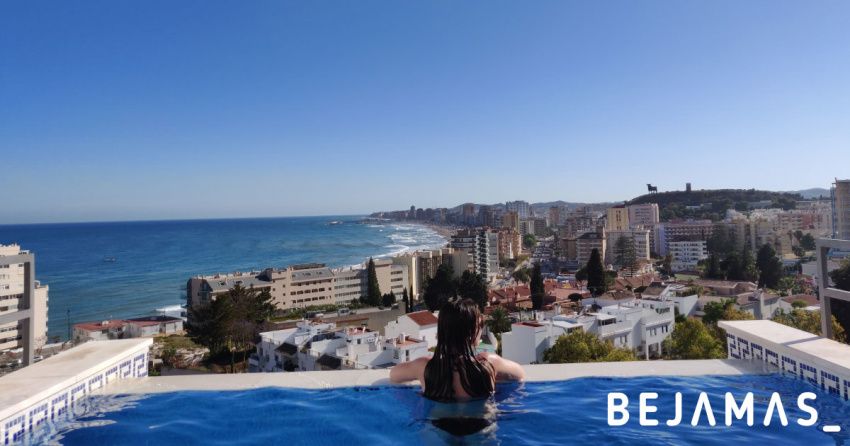
Transportation, To the Place
I won’t lie, the decision of choosing Malaga was also driven by how easy it was to get there for all of us. The Malaga airport has good flight connections with all the countries we were coming from and that tipped the balance.
Another challenge we faced was matching the arrival times for all team members and planning the activities for those who get there first. Cause no one wants to sit at the airport for a couple of hours, just waiting for others.
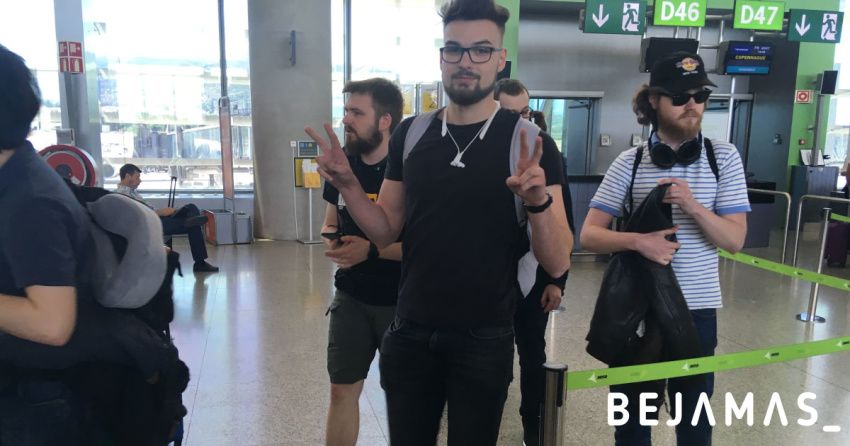
Transportation, at the Place
The public transportation was not bad, but we mainly used Uber Business service to get from one place to another. It was the fastest and most convenient option, and we really wanted to make the most out of the time we had there.
Retreat Communication Channels
Remember visiting cities with your classmates on a school trip? Walking all together, sticking to the plan, letting go taking a closer look to a cool spot you’re walking by. No fun at all, and we’re definitely too old for that.
You can let your team decide what they want to do themselves, creating small groups of people that have common interests and traveling style. But still, you have to keep some order so you don’t lose people and waste time trying to find them.
That’s where communication plan comes in. Exchanging phone numbers is a nice starter. We also created a Slack channel to catch up and discuss all the trip issues there. We are problem solvers. That’s what we do.
Food
What connects people better than good food and drinks? You really can’t visit Spain and not care about the serrano, manchego, gazpacho, and paella. We visited a couple of tapas bars, coffee shops, seafood restaurants… But this had to be limited somehow (or most of us would spend 90% of this trip visiting the restaurants and eating, which BTW would be lovely).
To make sure that the issue of consuming wouldn’t be that time-consuming, we opted for a catering company, meaning two nice ladies have been coming to our kitchen two times a day, cooking us Spanish dishes made from local products, while we focus better on company matters.
Do the math, think what option would be the best for your team and, under any circumstances, don’t forget about the vegans!

Teaching and Learning
Gathering your remote team together just calls for knowledge sharing. After all, the next opportunity to organize workshops for all of you won’t be that soon.
In Malaga, all of the Bejamers had an opportunity to learn about Google Tag Manager and React hooks from two experts - Jakub and Arek. Hats off guys and a real thank you from all of us!
It’s also a perfect occasion for smaller teams, like our marketing department, for example, to sit down and talk ideas for future projects and processes.
What glued us together was the introductory workshop at the beach, where everyone was in the spotlight for ten minutes, telling others their story. Warm personal stories, wine, sunset, and Jamstack related topics. Probably the most romantic evening of our lives.
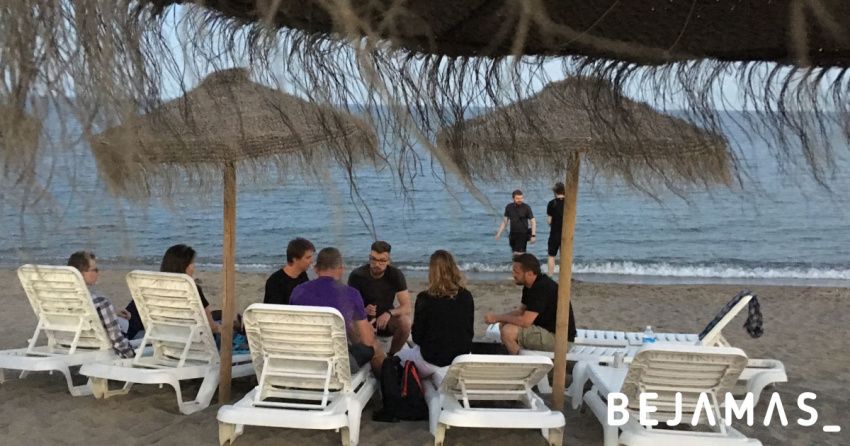
Fun Team Building Activities
Of course, the trip was not all about occasional workshops, drinking wine and eating shrimps. It’s crucial to fill (but not stuff) your retreat schedule with cool activities, matching what you like to be doing. But also give people other options, because we’re all different and chill in different ways.
Some like to think about the painting perspective in the Picasso museum? Cool. Others prefer chilling with a beer under an umbrella at the same time? Cool as well. Some of us for example, except traditional traveling activities, just mentioned, decided to really feel the mother Earth taking long barefoot walks through the stones and hot concrete. Others, less masochistic ones, preferred walking by the sea, looking for shells. To be honest, my feet still hurt.
After all, there’s always one thing that joints people together - fiesta. On the last evening of our trip, we all gathered around the big pan full of paella and enjoyed the last moments together.
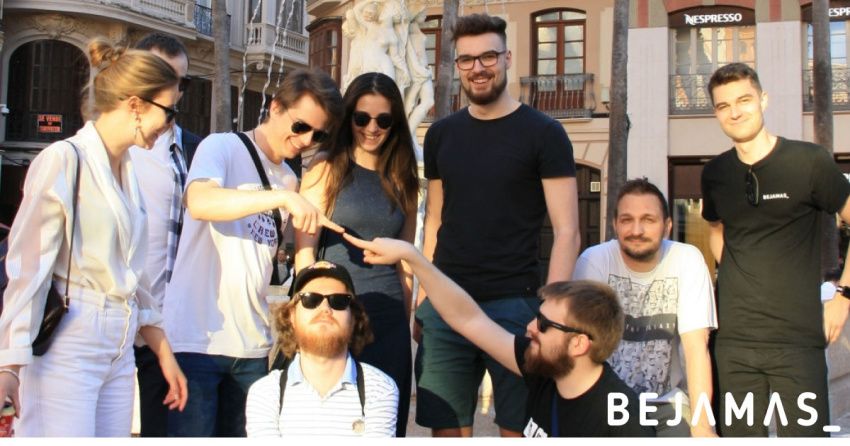
Don’t Plan Too Much
With team retreats, it’s tempting to plan everything ahead, creating a morning-to-evening agenda. While it gives you a nice, warm feeling of organization and security, it doesn’t really make things better.
For remote teams, you especially have to resist that temptation. People get to know each other in a more natural manner through unexpected moments and adventures than performing a strict plan. And don’t forget, people working remotely probably especially value their freedom.
Getting Feedback
- What did you like about the trip?
- What did you dislike?
- What could we do better next time?
- Do you have any ideas for the next trip?
Asking questions shortly after the trip ends will give you the precious insights that may come in handy when planning the next one. That will also give your team members the opportunity to reflect on how did the retreat impact them and the team.
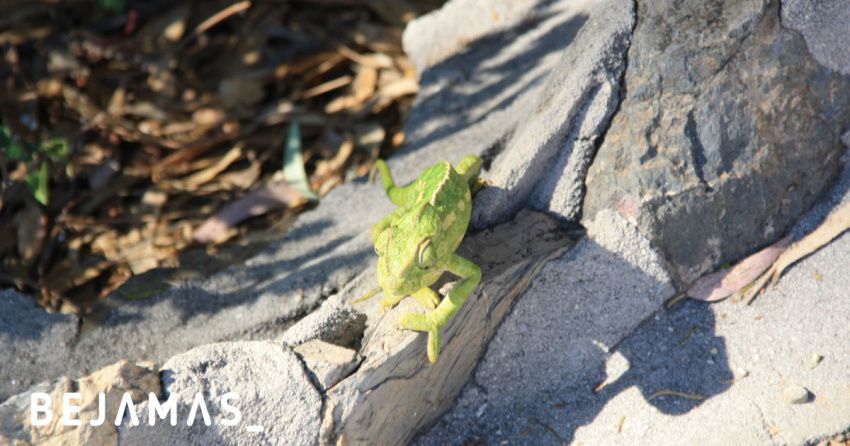
Running a remote development team can be tricky when it comes to teambuilding, but thoughtfully organized, cyclical company retreats can be the answer to most of these problems.
Plan them with a clear goal in mind and don’t stress too much. It’s a big event and it takes time to plan it, but it’s also a lot of fun.
And it will make your remote company a real close team.